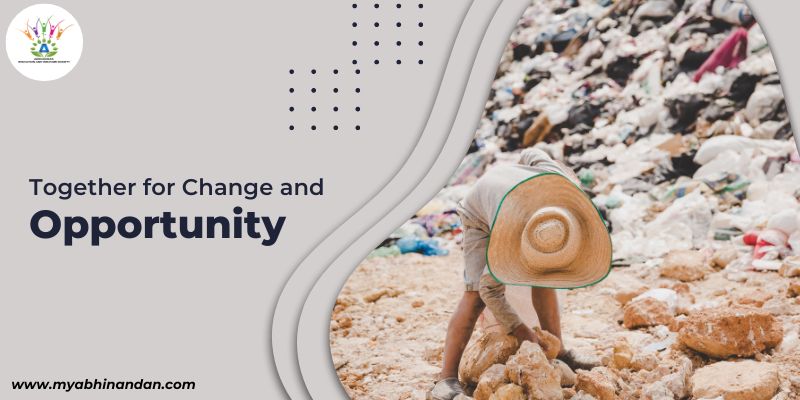India, a land of contrasts, is home to both bustling metropolises and sprawling slums. Amidst the chaos of urban life, there exists a community that often goes unnoticed—the rag pickers. These unsung heroes play a critical role in waste management, recycling, and sustainable development. In this blog, we delve into the strategies employed by NGOs to uplift the rag pickers’ community.
Income-Generation Programs
NGOs recognize that economic empowerment is key to improving the lives of rag pickers. Income-generation programs aim to provide alternative livelihoods beyond scavenging. Here are some initiatives:
- Micro-Enterprises: NGOs collaborate with rag pickers to establish small businesses. These micro-enterprises include recycling units, composting centers, and handicraft workshops. By creating value from waste materials, rag pickers contribute to both their income and environmental conservation.
- Market Linkages: NGOs facilitate access to markets for recycled goods. Whether it’s selling paper, plastic, or metal, connecting rag pickers to buyers ensures a steady income stream. These linkages also promote circular economy practices.
Skill-Building Workshops
Skill development is a game-changer for rag pickers. NGOs organize workshops to enhance their abilities. Here’s how:
- Literacy and Numeracy: Basic education opens doors. NGOs run literacy classes, teaching rag pickers to read, write, and perform simple calculations. This empowers them to negotiate better deals and manage their finances.
- Vocational Training: From tailoring to carpentry, vocational training equips rag pickers with marketable skills. They can transition from waste collection to more stable occupations.
Sustainable Development
Sustainability lies at the heart of NGO interventions. Here’s how they promote it:
- Health and Hygiene: NGOs conduct health camps, providing medical check-ups and hygiene kits. Rag pickers face health risks due to exposure to hazardous waste. By addressing these issues, NGOs improve their overall well-being.
- Advocacy and Legal Aid: NGOs advocate for rag pickers’ rights. They help them access government schemes, secure identity documents, and fight against discrimination.
- Environmental Awareness: NGOs educate rag pickers about waste segregation, composting, and eco-friendly practices. By instilling environmental consciousness, they contribute to a cleaner, greener India.
Micro-Enterprises: A Path to Self-Reliance
Micro-enterprises empower rag pickers to become self-reliant entrepreneurs. These ventures not only provide income but also foster a sense of ownership. Some successful micro-enterprises include:
- Recycling Units: Rag pickers can set up small recycling units where they sort and process recyclable materials. These units contribute to waste reduction and create employment opportunities.
- Composting Centers: Composting organic waste is essential for sustainable agriculture. NGOs guide rag pickers in establishing composting centers, turning waste into nutrient-rich soil.
- Handicraft Workshops: Rag pickers can learn skills like weaving, pottery, or jewelry-making. These workshops transform discarded materials into beautiful handicrafts, generating income and preserving cultural heritage.
Vocational Training: Unlocking Potential
NGOs offer vocational training to enhance rag pickers’ skills. Here are some specialized areas:
- Computer Literacy: Basic computer skills open doors to online marketplaces and administrative work. NGOs provide training in using computers and the internet effectively.
- Upcycling Techniques: Rag pickers learn creative ways to upcycle waste materials. From making bags out of old banners to crafting jewelry from bottle caps, these skills add value to discarded items.
Advocacy and Policy Reform
NGOs actively advocate for rag pickers’ rights:
- Policy Influence: NGOs collaborate with policymakers to create supportive policies. These policies address issues like waste management, social security, and fair wages for rag pickers.
- Social Inclusion: NGOs work to reduce the stigma associated with rag picking. They organize awareness campaigns, encouraging society to recognize the dignity of this profession.
Conclusion
NGOs play a pivotal role in transforming the lives of rag pickers. Through income-generation programs, skill-building workshops, and sustainable development initiatives, they empower this resilient community. Let’s recognize their efforts and work together for a more inclusive and compassionate society.
Tags: ngos for rag pickers community, Rag Pickers Community, rag pickers community development, Skill Development, Sustainable Development

